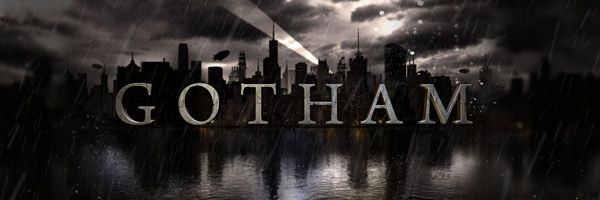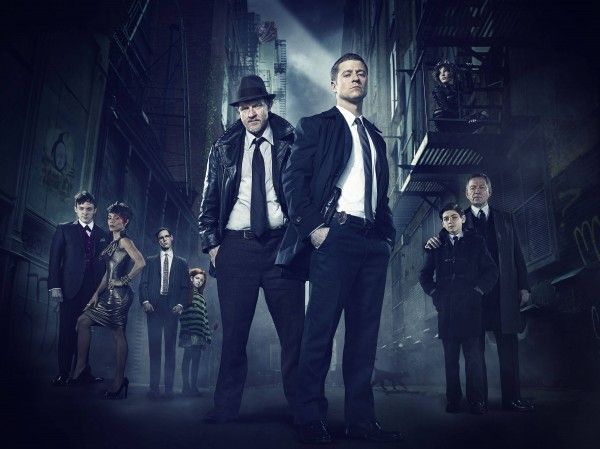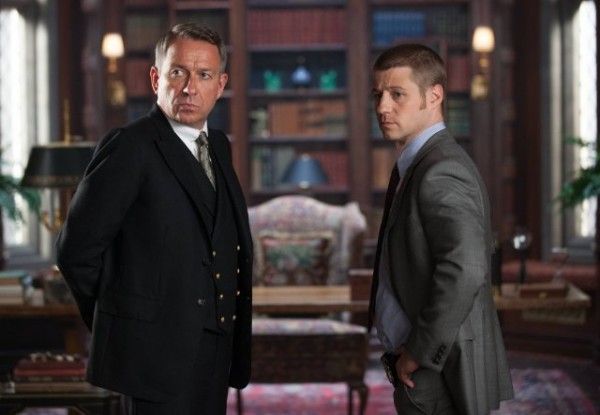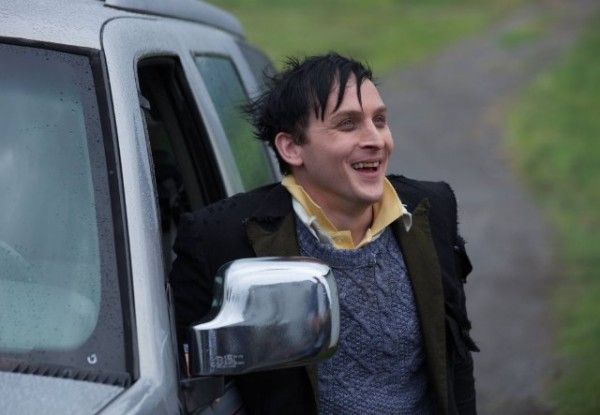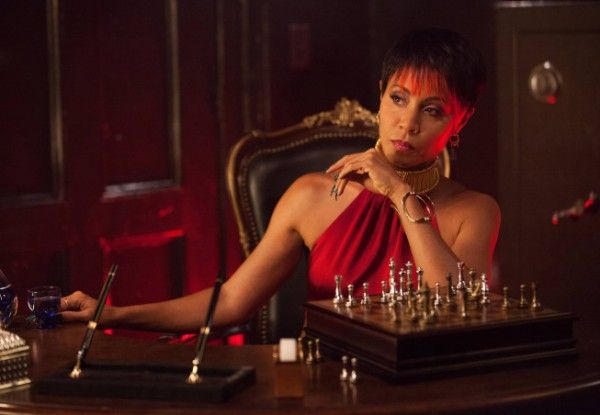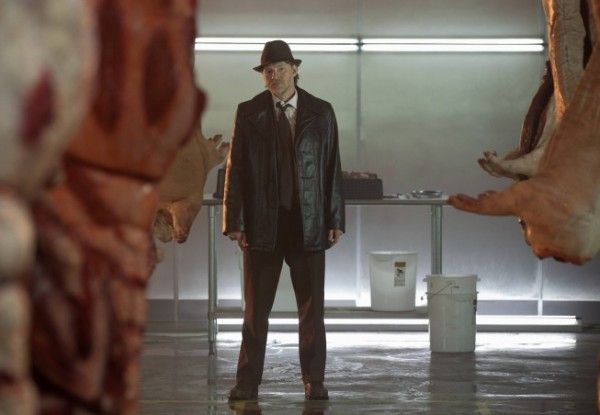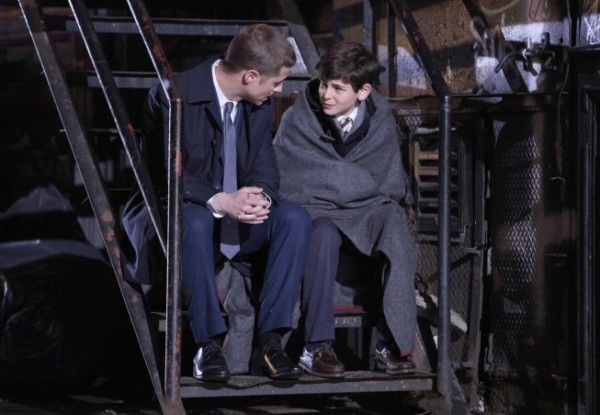Only a handful of episodes into the first season of the Fox series Gotham and already all of the fans have their own opinions on which heroes and villains they’d like to see make appearances, at some point. With characters from 75 years of Batman canon mixed with characters invented solely for the show, it will be interesting to see how it all plays out in a world of origin stories.
As part of PaleyFest NY, which is considered the ultimate TV fan festival, co-stars Ben McKenzie, Donal Logue, Jada Pinkett Smith, Sean Pertwee and Robin Lord Taylor, along with executive producer Danny Cannon, talked about the additional six-episode order they just received, making the season 22 episodes instead of 16, putting their own stamp on these roles, that there’s good and bad in everyone in Gotham, interesting fan encounters, the fandom for this show, that a lot of characters will pop their heads in and out, you just won’t know when, balancing the aesthetics of a graphic novel while creating characters who are believable and somewhat grounded in reality, whether any characters from the Justice Society might appear, figuring out the timeline to make sure the character’s ages will match up later on, and their favorite Batman characters. Check out what they had to say after the jump.
Question: Danny, you had mapped out a 16-episode arc for the series, and then you got the news that it was picked up for six more episodes. What are you going to do with all of that extra time?
DANNY CANNON: Well, you’ll notice that Bruno [Heller] is not here. He’s already working on it. Luckily, Batman has been around for 75 years, and that’s for a reason. There is endless pool with which to delve into. We get to go back to origin stories that didn’t exist, and that’s a lot of fun. I’m sure we’ll figure it out.
Ben, is it challenging for you to be so serious as Jim Gordon?
BEN McKENZIE: I smile a lot more in my actual life than I do on this show, for sure. We’re working on that. You have to earn humor with Gordon because he is actually supposed to be a serious guy, unlike myself. I try to play it straight.
But, Fish Mooney says that he has a little danger in his eyes. Where do you think that comes from?
McKENZIE: His danger comes from serving overseas and seeing real war. He comes back to a war at home that has different rules, or no rules, you might say. So, he’s adjusting to that. But, he understands war and killing and the worst of humanity. He just has to rise above it.
Auditioning for Fish Mooney seems to be the scariest thing in the world. Jada, as an actress, have any of your own audition stories informed how you play those scenes?
JADA PINKETT SMITH: Well, what was interesting was that I took a meeting with Bruno in L.A., and then I got to meet Danny in New York. I came in with a gown and a short black wig, with a young man on a leash, who had no shirt on and “liar” written across his forward in lipstick. That was my first introduction to Danny. I thought, “Forget it, instead of talking about who Fish Mooney is, let me just show him.” I went method on it, definitely.
DONAL LOGUE: I did so well at that, they made me Harvey Bullock.
Robin, have you had any particularly interesting fan encounters since this show started?
ROBIN LORD TAYLOR: Everyone has been incredibly nice. It’s fun shooting in New York City because you get used to seeing people on shows, out on the street, walking around going their daily lives. New Yorkers are so self-obsessed that they usually don’t even notice. They’re like, “Okay, it’s that guy, but I have stuff to do.” I was having a salad and three or four people kept coming up, and I was like, “Can I eat my salad?” But, it was great.
Sean, this Alfred is a little feistier, tougher and scarier than we’ve seen before. What’s the key to putting your own stamp on it?
SEAN PERTWEE: Well, it really came from Danny and Bruno. When we first started, I put together a character bible that I presented to Bruno on the first day. You have to find your own language and heartbeat with a character, especially when it’s been played by such icons. But, you’ve never actually seen his history and his journey. It was a fascinating research journey. He’s been nominated to be a guardian to the richest man on the planet. Why? Why did the Waynes actually select him? He’s there for a reason. So, Danny and I and Bruno have been working together on giving him a backstory. We just shot Episode 10, and you find out why. There’s a big reveal, and you see why he’s there.
Donal, how do you think working with Jim Gordon will change Harvey Bullock’s outlook on things?
LOGUE: I think it has, from the get-go. I think Harvey has seen maybe 50 Jim Gordon wannabes run through, and then crash and burn. They want to be a do-gooder, and then get crushed by Gotham. But, Jim Gordon is a man of such quality that it changes it for him. He can really back it up. An episode is coming where it shows that maybe Harvey wasn’t so dissimilar when he was younger, and what happened to change him, and where they find common ground and respect. I love the way that we get close, and then we come apart. And what’s really been fun is that, now that these initial episodes have set this template, the world is opening up. It’s a real joy for us just to get to see what other people were doing when we weren’t there. The world is just expanding and moving more quickly and getting more colorful, so it’s becoming more and more fun.
No one in Gotham is either all good or all bad, except for maybe Fish Mooney. Jada, do you think she has some good in her?
PINKETT SMITH: Absolutely! I’m sure [you’ll see some of that]. I think you’ll get her backstory and learn why she operates the way that she does. But she definitely has another side to her, for sure. We all do, somewhere.
Robin, how do you get into character as Oswald Cobblepot, physically and with the voice?
TAYLOR: The way I speak is the way it’s written. Bruno and the whole writing team have created such a specific language for him that it’s all right there, on the page. In terms of the walk, it was a great thing to discover because it comes out of an actual injury. It’s a realistic thing. It’s not just some affectation. It comes from real pain. There was one day when we were shooting, and we did a big wide shot. We wrapped it all up, and I went to sit down and wait for my next thing, and I realized that I completely forgot the walk. I flipped out and went back and was like, “Did I completely ruin everything?” We have an amazing wardrobe assistant, who looked at me and said, “What if I put a bottle cap in your shoe?” And since then, it’s still in my shoe. It’s an old Stella Adler trick. It just brings that pain, and it’s a reminder.
Sean, your father, Jon Pertwee, was very well known from Doctor Who, so you know a little something about shows with passionate fan bases. How would you describe the evolution of fandom?
PERTWEE: I’ve been living in Brooklyn and we’ve been shooting a lot, but I am blown away. There’s a huge fan base for this franchise, and I know we were all concerned about them, when we were releasing the show. We wanted them to like it and like our world and like our take. What I’m really delighted by is that the people who have approached me and spoken to me have been newbies. There have been women and men who have never entered this world before. That’s what I’m delighted with. We’re developing a new legion of fans for our world. I’m very, very proud of that.
Danny, are there some ideas that have just not left the writers’ room because they were a little too crazy?
CANNON: Yes. The greatest thing was talking to Geoff Johns at DC, and going back into the huge canon of work and putting them up on the wall and saying, “Who is old enough? Who is young enough? How could they intersect? Could this be the son of this person?” We spent a lot of time doing that. That was one of those days where you drive home going, “I can’t believe that’s my job. That just happened.” It was quite amazing to me, how many of these characters did not have backstories and origin stories. We get to go back to them as children. We get to go back to them as teenagers. We get to see the kids of or the siblings of these characters. It’s really quite interesting.
You’ve hinted at some characters that might return, including Harley Quinn. What can you say about that?
CANNON: It’s much better to have a show where the anticipation for these characters is better than me saying it’s going to happen next November. But, there are a lot of characters that are going to pop their heads up.
Jada, what are the pros and cons of developing a character that’s not in the canon?
PINKETT SMITH: It’s funny, I only saw pros. That’s something I always do. Very rarely, do I think about cons. Once I’m in, I’m in. So, when I sat down and talked to Bruno, and he was talking to me about the character and the idea of having the opportunity to collaborate in creating something, being a comic book fan, I was like, “Oh, my goodness, you mean to tell me that I get to participate in creating a character that’s going to be a part of the canon?! Oh, my god, I’ve gotta do this!” I really geeked out, big time. That, to me, was the biggest selling point. I was able to sit with Bruno and Danny and really collaborate, and I know I drove them both absolutely crazy.
CANNON: On the contrary, it was the most creative process. Pre-production is everything. Shooting is academic. Pre-production is where the creativity is, and it was frothy. I kept thinking I had a cold and was going to get sick before I did this. I was just excited. I literally had goose bumps, all day.
Danny, how difficult is it for you to balance the aesthetics of a graphic novel while creating characters who are believable and somewhat grounded in reality?
CANNON: That’s how you sell an alternative reality. You completely believe in every single one of these characters. It’s really happening. All we’re doing is altering things slightly. It’s a New York that didn’t get gentrified. It’s a New York that’s lost in time. It’s falling apart. It’s rotting from the inside, in a delicious way. That was the New York that I always wanted to visit. You keep your feet on the ground by having a great cast, and by having words put in your mouth by a wonderful writing staff. We don’t question this world, and we hope nobody else will.
What’s that like for the actors to deal with?
McKENZIE: I think it works relatively naturally. We have really talented writers. It’s all about the words.
PERTWEE: They’re crystal clear. We do table reads together, so we hear the voice of the piece. That helps, massively. You know what’s going on when your paths cross with someone.
McKENZIE: It’s definitely one of the most collaborative work experiences I’ve ever had. It’s almost utterly ego free, which is really remarkable, given the stakes at play.
LOGUE: It’s the quality of the writing staff. There are some cases where people do not want anything messed with, but they’re also not on set. When you’re on set, even just the nature of the room can be so different that it screams at you to comment on it. In some cases, you can’t do that. Here, they’re always open to conversation. That’s not always easy for the writers because they’ve put this whole world in place, but they’ve been incredibly collaborative.
If you had the choice to pick any hero or villain from the DC universe to make a cameo appearance, who would it be?
PINKETT SMITH: Maybe Canary. I think I’d have a good time with that. I think I could kick tail like her.
PERTWEE: In Episode 7, we have Victor Zsasz show up. It’s an actor that I worked with on a previous show, and he really brings it. It’s a young Victor Zsasz, but he really brings it. It’s cool.
Who is your favorite Batman character and why?
PERTWEE: It has to be Batman, and the enduring goodness of Batman. We all hope that someone like that exists, who cares enough to put himself on the line.
TAYLOR: The Joker, by far, because you don’t know what he’s going to do. The sheer glee and pathology of that character is haunting.
PINKETT SMITH: I can’t get passed Bane. I really love Bane. He’s one of my favorites, as far as villains.
LOGUE: I love the idea that someone as strong and amazing as Batman can stand up for the weak and the oppressed, and then there’s the Nietzsche inside of The Joker. And just reading Gotham Central, I really love Montoya and Allen.
McKENZIE: I have a toss-up between Harvey Dent and Scarecrow.
CANNON: Harley Quinn is good.
Danny, has there been any discussion or concern about introducing characters and villains that are usually around Batman’s own age group, when you’re dealing with a Bruce Wayne that’s about 12 years old, and having them be much older now, to have them on the show?
CANNON: Yes, that was a timeline that was figured out. We wanted to make sure that the villains are still going to be close to his age in 18 years, when Batman is who Batman is. We wanted these people to still seem similar to his age. That’s why we’re going back in time quite a bit, to have very young characters. It’s tough because you have in mind what Harvey Dent is, and you have in mind what these people are. So, casting much younger actors, in order to get that time right, is proving difficult. But if we get it right, it’s a very exciting thing.
Because of the timeline, might there be some appearances by members of the Justice Society?
CANNON: For these first few seasons, it’s much more a question of laying a foundation. I don’t think you can build this complicated structure unless the foundation is solid. For right now, I think it’s much more about establishing these characters and establishing their backstories, having a foundation where these strange things can happen, and keeping our feet on the ground. What I’ve really loved about Batman was that he is a man. He’s not from another planet. He doesn’t have any supernatural planet. He’s a man, like everybody else, who wears the mask. Batman is an ideal and an ideology. Anybody could wear that. That’s why there have been so many successful Batmans. So, for now, we’re staying in that world of very grounded people you could meet on the street of Gotham.
McKENZIE: What’s interesting about focusing on Gordon as a precursor to Batman, and Bruce learning from Jim and Alfred, and all of these male and female role models that exist in the society of Gotham before he turns into Batman, what is he taking away from each one of them.
CANNON: The writers are doing a great job. There are some very great moments with Bruce Wayne coming up. What happens to this kid? What happens to somebody who loses their parents, but is sitting on all of the money in the world? Does that make them happy, or does that make them sad? There’s a great moment coming up where he says to Alfred, “I’m angry all the time. Will that ever end?” It’s a beautiful moment.
Gotham airs on Monday nights on Fox.

